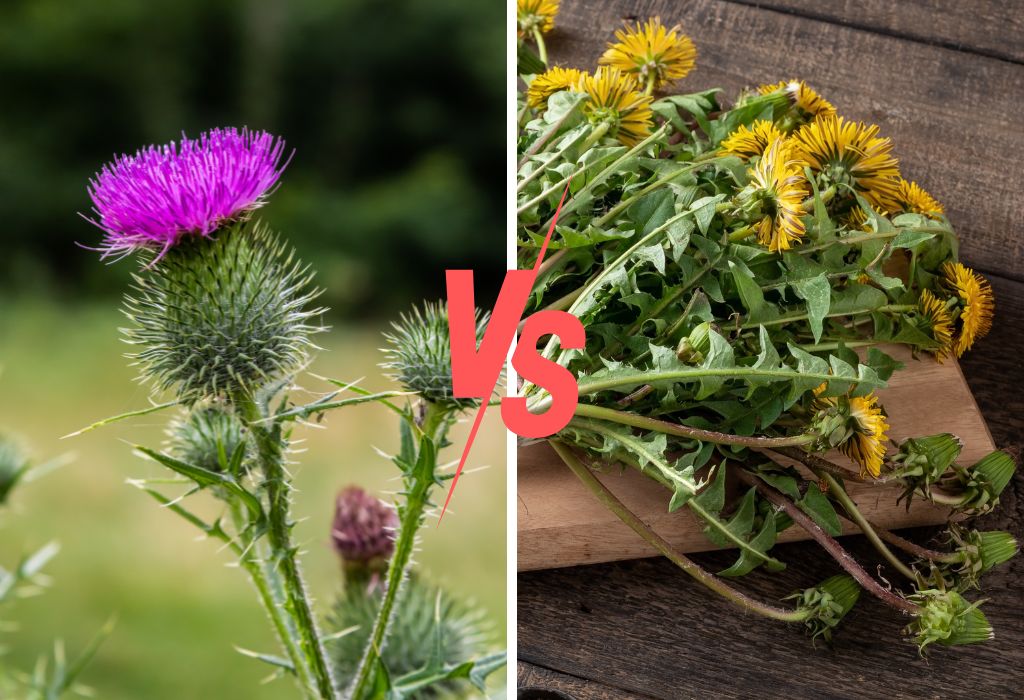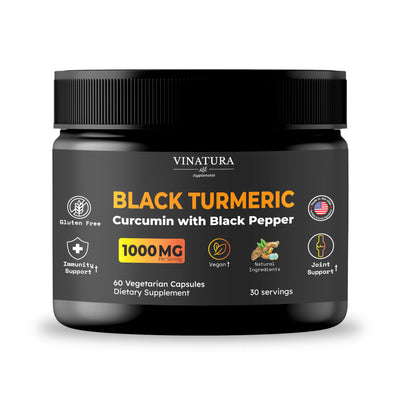
Milk Thistle vs Dandelion: Which Liver-Supporting Herb Is Better?
Many people use natural herbs to protect and support liver health. Two of the most popular herbs for the liver are Milk Thistle and Dandelion. So, which type is better? This article will compare Milk Thistle vs Dandelion in terms of mechanism of action, benefits, and side effects and help you choose the herb that best suits your needs.
Before exploring further, please read the disclaimer located at the end of this webpage.
Key Takeaways
- Milk Thistle and Dandelion have been used for a long time, and both support the liver in different ways.
- Milk thistle is known for its ability to protect the liver from damage caused by toxins.
- Meanwhile, Dandelion helps improve bile circulation and aids digestion.
- Choosing which herbal medicine, Milk Thistle vs Dandelion, is better depends on your needs and health condition.
- Consult your doctor before using Milk Thistle or Dandelion, especially if you are pregnant or nursing or are taking any other medication.
The Overview of Milk Thistle

What is Milk Thistle?
Milk thistle is a herb native to the Mediterranean, most commonly found in the eastern United States, California, South America, Africa, Australia, and Asia. The seeds of this plant contain Silymarin, a compound with powerful hepatoprotective, antioxidant, and anti-inflammatory effects. [1]
Critical Benefits of Milk Thistle
Protect Liver Cells
Silymarin in Milk Thistle can fight substances toxic to the liver and stimulate the production of new liver cells [2].
Specularly, scientists believe Silymarin shields liver cells from harmful toxins in the bloodstream. It also aids the liver's detoxification process and neutralizes free radicals. These free radicals are unstable molecules, a byproduct of the body's natural functions, that can damage healthy cells and contribute to health issues.
Supports the Treatment of Liver Diseases
Currently, milk thistle is most commonly used orally for liver disorders, including liver damage caused by chemicals, alcohol, and chemotherapy, as well as liver damage caused by Amanita mushroom poisoning, infectious liver disease, and liver damage. Non-alcoholic fatty liver disease, acute hepatitis, cirrhosis, and chronic hepatitis [3].
Reduce Cholesterol
Some studies show that milk thistle may help reduce bad cholesterol (LDL) and increase good cholesterol (HDL). [4]
In addition, the main ingredient in milk thistle is Silymarin, which also acts as an anti-inflammatory, antioxidant, and hypoglycemic agent.
Interactions and Potential Side Effects of Milk Thistle
As of now, milk thistle extract is safe for most users. However, for some people, taking milk thistle extract can cause diarrhea, nausea, bloating, loss of appetite, and possibly headaches.
It should be noted that there is currently not enough reliable evidence to know whether milk thistle is safe to use during pregnancy or breastfeeding. Therefore, pregnant women and breastfeeding mothers should consult medical professionals before using this medicinal herb.
Dandelion: What is It and How Does It Benefit for Health?

What is Dandelion?
Dandelion (Taraxacum officinale) is a popular herbaceous plant that grows worldwide and is used as a medicinal herb beneficial to human health. Although the Dandelion tree originates from Europe, because of its ability to proliferate in many different climates, the Dandelion tree can now be found in many parts of the world, from Asia, Africa, and even Africa. America. Its leaves, flowers, and roots are used to make medicine. Dandelion contains many nutrients, including vitamins A, C, K, calcium, potassium, and iron.
Critical Benefits of Dandelion for Health
Diuretic
Dandelion helps eliminate excess water in the body, thereby supporting detoxification and reducing edema. Currently, modern science proves that dandelions contain potassium and insulin, which have diuretic effects. [5]
Potassium is a mineral that helps regulate blood pressure and protective functions, and inulin is a non-digestible fiber that enhances protective functions and urine secretion. Thanks to these substances, dandelions can remove toxins from the body, helping to rehydrate and balance electrolytes.
Anti-parasitic Effect
Dandelion has been effective in supporting gastrointestinal worm infections since ancient times. This anti-parasitic property is considered an effect of thujone. However, evidence of this specific effect is still only historical.
Notably, animal and laboratory studies show that this herb may fight tapeworms and some other parasites, although these studies may not apply to humans [ 6]. Therefore, more in-depth research is needed to evaluate this effect of Dandelion.
Rich in Antioxidants
Besides thujone, Dandelion also contains another exciting compound, chamazulene. Chamazulene acts as an antioxidant.
Antioxidants such as chamazulene can fight oxidative stress in the body, leading to cancer, cardiovascular diseases, Alzheimer's disease, and several other diseases [7].
However, more research is needed on the properties of this compound.
Side Effects and Interactions of Dandelion
Dandelion is generally well tolerated and considered relatively safe to use. However, some people may experience mild side effects such as nausea, diarrhea, and stomach pain. Dandelions may interact with certain medications, including blood thinners, blood pressure medications, and diuretics. Consult your doctor before using Dandelion if you are taking any medications.
Milk Thistle vs Dandelion: The Comprehensive Comparison

Mechanism of Action
- Milk Thistle: Silymarin in milk thistle is an antioxidant and protects liver cells.
- Dandelion: Dandelion is a diuretic and stimulates bile production, indirectly supporting liver function.
Unique Benefits
- Milk Thistle: Prioritized for liver problems such as hepatitis, fatty liver, and cirrhosis.
- Dandelion: Suitable for people suffering from edema, constipation, or wanting to improve digestion.
Milk Thistle and Dandelion: Which is Safer?
Milk Thistle and Dandelion are safe when used in the correct dosage. However, pregnant and breastfeeding women should avoid using Dandelion.
Milk Thistle vs Dandelion: Which Liver-Supporting Herb Is Better?
Which herbal option is better depends on your needs and health condition. If:
- If you are looking for an herb to protect your liver from damage caused by toxins, Milk Thistle is a better choice.
- If you are having digestive problems or need bile circulation support, Dandelion is a better choice.
Can I Substitute Dandelion For Milk Thistle And Vice Versa?
Although Milk Thistle and Dandelion benefit liver health, they work differently. Therefore, it is recommended to partially type with the other completely.
However, you can combine both herbs to get maximum benefits. Some liver health supplements contain both Milk Thistle and Dandelion.
Things to Remember When Taking Milk Thistle and Dandelion
Here are four things you should remember when taking Milk Thistle and Dandelion:
- Start with a low dose and gradually increase if necessary.
- Use high-quality products from reputable manufacturers.
- Consult your doctor before use
- Do not use Milk Thistle or Dandelion if you are allergic to their ingredients.
Other Liver-Supporting Herbs You Can Choose

In addition to Milk Thistle and Dandelion, a whole world of herbs can support your liver's health! Here are some exciting options:
- Artichoke: This heart-shaped vegetable contains cynarin, a compound that promotes bile production and protects liver cells from harmful toxins.
- Jiaogulan (Gynostemma pentaphyllum): Also known as "Southern Ginseng," this herb boasts adaptogenic properties, meaning it may help the body better adapt to stress, which can take a toll on the liver. Early research also suggests it may have antioxidant and anti-inflammatory effects that benefit the liver.
- Turmeric: Known for its powerful properties. Curcumin may help reduce oxidative stress and potentially limit fat accumulation in the liver.
Conclusion
Milk thistle and Dandelion are safe and effective herbal options for supporting liver health. Milk thistle vs Dandelion: which herbal option is better depends on your specific needs and health condition. Please consult your doctor before using any herbs.
References
- [1] George, T., & Patel, R. K. (2019, September 3). Milk Thistle. Nih.gov; StatPearls Publishing. https://www.ncbi.nlm.nih.gov/books/NBK541075/
- [2] Abenavoli, L., Capasso, R., Milic, N., & Capasso, F. (2010). Milk thistle in liver diseases: past, present, future. Phytotherapy Research, 24(10), 1423–1432. https://doi.org/10.1002/ptr.3207
- [3] M.D. Kenneth Flora, M.D. Martin Hahn, M.D. Hugo Rosen, & M.D. Kent Benner. (2021). Milk thistle (Silybum marianum) for the therapy of liver disease. The American Journal of Gastroenterology, 93(2), 139–143. https://doi.org/10.1016/S0002-9270(97)00082-8
- [4] Kazazis, C. E., Evangelopoulos, A. A., Kollas, A., & Vallianou, N. G. (2014). The Therapeutic Potential of Milk Thistle in Diabetes. The Review of Diabetic Studies, 11(2), 167–174. https://doi.org/10.1900/rds.2014.11.167
- [5] Pfingstgraf, I. O., Taulescu, M., Pop, R. M., Orăsan, R., Vlase, L., Uifalean, A., Todea, D., Alexescu, T., Toma, C., & Pârvu, A. E. (2021). Protective Effects of Taraxacum officinale L. (Dandelion) Root Extract in Experimental Acute on Chronic Liver Failure. Antioxidants (Basel, Switzerland), 10(4). https://doi.org/10.3390/antiox10040504
- [6] Hamza, A. A., Mohamed, M. G., Lashin, F. M., & Amin, A. (2020). Dandelion prevents liver fibrosis, inflammatory response, and oxidative stress in rats. The Journal of Basic and Applied Zoology, 81(1). https://doi.org/10.1186/s41936-020-00177-9
- [7] Davaatseren, M., Hur, H. J., Yang, H. J., Hwang, J.-T., Park, J. H., Kim, H.-J., Kim, M. J., Kwon, D. Y., & Sung, M. J. (2013). Taraxacum official (dandelion) leaf extract alleviates high-fat diet-induced nonalcoholic fatty liver. Food and Chemical Toxicology: An International Journal Published for the British Industrial Biological Research Association, 58, 30–36. https://doi.org/10.1016/j.fct.2013.04.023
Author

Product Disclaimer
The dietary supplement products mentioned on this website are formulated based on scientific research and adhere to FDA guidelines for dietary supplements. However, the content of the articles has not been evaluated by the Food and Drug Administration (FDA) and is not intended to promote or endorse any specific product. Any products sold on this website are not intended to diagnose, treat, cure, or prevent any disease.
Opinions and Endorsements
Any claims, statements, or opinions expressed in the articles are those of the author(s) and do not necessarily reflect the views or opinions of the manufacturers of the dietary supplement products. The products sold on this website are separate from the content of the articles and are not directly endorsed or associated with the information presented here.
Liability Disclaimer
The author(s) of the articles, website, and manufacturers of the dietary supplement products do not assume any liability for any potential consequences arising from the use of the information provided in the articles. It is recommended that individuals consult with a qualified healthcare professional before making any dietary or lifestyle changes, including the use of dietary supplements.
Product Usage
Please refer to the product labels and packaging for specific usage instructions and guidelines for the dietary supplement products sold on this website.
Customer Support
For any concerns or questions regarding the dietary supplement products, please contact our customer support team, who will be more than happy to assist you.





Leave a Comment
Be the first to comment.
What do you think?